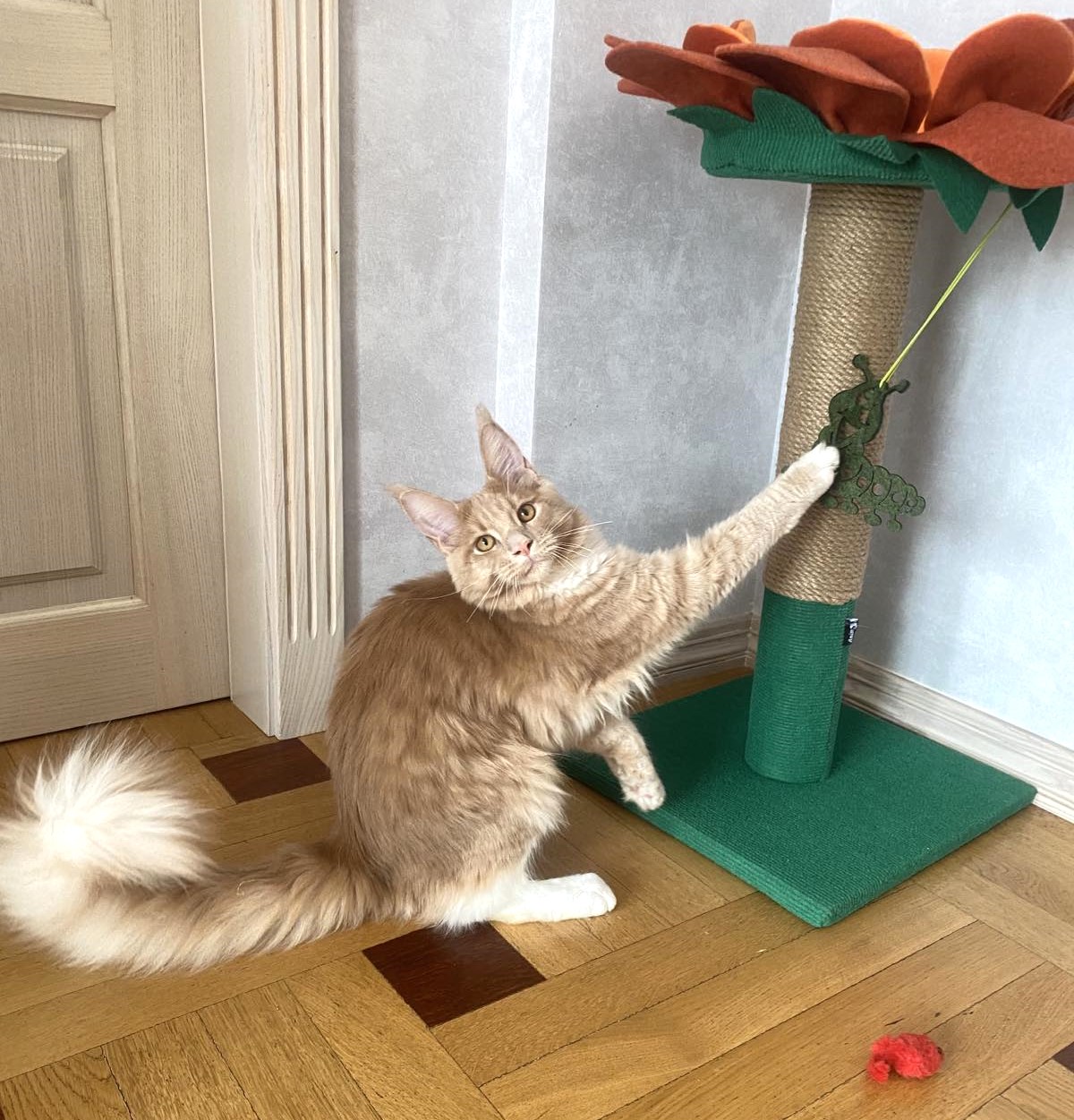Viral diseases of Maine Coons

Maine Coons, like all cats, are susceptible to viruses. Cat viruses are classified into:
- Retroviruses
- Intestinal viruses
- Respiratory viruses
-
Retroviruses in Maine Coons:
Retroviruses in Maine Coons are a group of viruses that can cause severe diseases, affecting the immune system and other organs. The main retroviral infections found in cats include:
1. Feline Leukemia Virus (FeLV):
- This retrovirus causes an infection that suppresses the immune system, making cats vulnerable to other infections and tumor development. It is transmitted through close contact with infected cats, as well as saliva, blood, and other fluids. Symptoms may include lethargy, weight loss, anemia, respiratory infections, and tumors.
- FeLV is one of the most serious infections in cats, often leading to a fatal outcome. Vaccination and controlling contact with infected animals help prevent infection.
2. Feline Immunodeficiency Virus (FIV):
- This virus is similar to HIV in humans and attacks the cat’s immune system, gradually weakening it. Infected cats may not show symptoms for a long time but eventually become susceptible to various infections and diseases. FIV is primarily transmitted through bites and wounds during fights. Symptoms include weight loss, fever, swollen lymph nodes, oral infections, anemia, and other health issues.
- Unlike FeLV, FIV vaccination is
not always effective, and the primary method of prevention is avoiding fights and contact with infected animals.
3. Spontaneous Feline Retrovirus (SFV):
- A less-studied type of retrovirus in cats, which usually does not cause serious diseases. However, it may combine with other infections and impact overall health.
-
Prevention and Treatment:
- Prevention includes FeLV vaccination, avoiding contact with infected cats, and timely detection via blood tests.
- Treatment is symptomatic, as there is no specific cure for retroviral infections.
Intestinal Viruses in Maine Coons:
Intestinal viruses in Maine Coons cause inflammation and damage to the gastrointestinal tract, leading to symptoms such as diarrhea, vomiting, and dehydration. Key intestinal viruses include:
1. Feline Panleukopenia (Feline Parvovirus):
- One of the most serious and dangerous viruses for cats, especially kittens. It causes acute gastroenteritis, with severe vomiting, diarrhea, high fever, and dehydration. Without timely treatment, the disease can be fatal. Vaccination is the primary means of prevention.
2. Feline Coronavirus (FCoV):
- Exists in two forms. The mild form causes moderate diarrhea, but the virus may mutate into a more dangerous form, Feline Infectious Peritonitis (FIP), which is often fatal. This virus is easily transmitted via the fecal-oral route.
3. Rotavirus and Astrovirus:
- These viruses may cause gastrointestinal disorders in cats, though they are less common. Symptoms may include mild to moderate diarrhea.
4. Feline Calicivirus (FCV):
- While primarily affecting the respiratory system, it can also cause gastrointestinal issues, especially in young or weakened cats.
-
Prevention:
Vaccination, proper hygiene, limiting contact with sick animals, and regular veterinary check-ups are key preventive measures.
Respiratory Viruses in Maine Coons:
Respiratory viruses in Maine Coons cause diseases of the respiratory system, often with symptoms such as sneezing, coughing, runny nose, watery eyes, and difficulty breathing. Key respiratory viruses include:
1. Feline Herpesvirus (FHV-1):
- Also known as feline rhinotracheitis. It causes inflammation of the nasal and eye mucous membranes, fever, sneezing, nasal and eye discharge, and conjunctivitis. It is transmitted through contact with infected cats or contaminated objects.
- After the initial infection, the virus can remain dormant and reactivate during stress or immune suppression.
2. Feline Calicivirus (FCV):
- This virus causes respiratory infections, joint inflammation (causing lameness), and mouth ulcers. Symptoms include sneezing, coughing, nasal and eye discharge, mouth ulcers, fever, and lethargy.
It spreads through saliva, airborne droplets, and contaminated objects.
- Calicivirus is more resilient in the environment, increasing the risk of spread.
3. Feline Parainfluenza Virus:
- A less common respiratory virus that causes mild respiratory infections. Symptoms include coughing, sneezing, and nasal discharge, and it can be complicated by bacterial infections.
-
Symptoms of Respiratory Infections in Maine Coons:
- Sneezing
- Runny nose
- Eye discharge
- Coughing
- Fever
- Loss of appetite
- Lethargy
-
Treatment and Prevention:
- Treatment is symptomatic and may include antiviral medications, antibiotics (to prevent secondary bacterial infections), and supportive care (humidifying the air, cleaning the eyes and nose).
- Prevention includes vaccination against FHV-1 and FCV, which is typically part of a standard vaccination program.
Viral infections are most common in autumn and spring when there is no frost or strong sunlight.
Vaccination does not guarantee that a Maine Coon will not get sick, but it helps ensure that the disease will be milder.